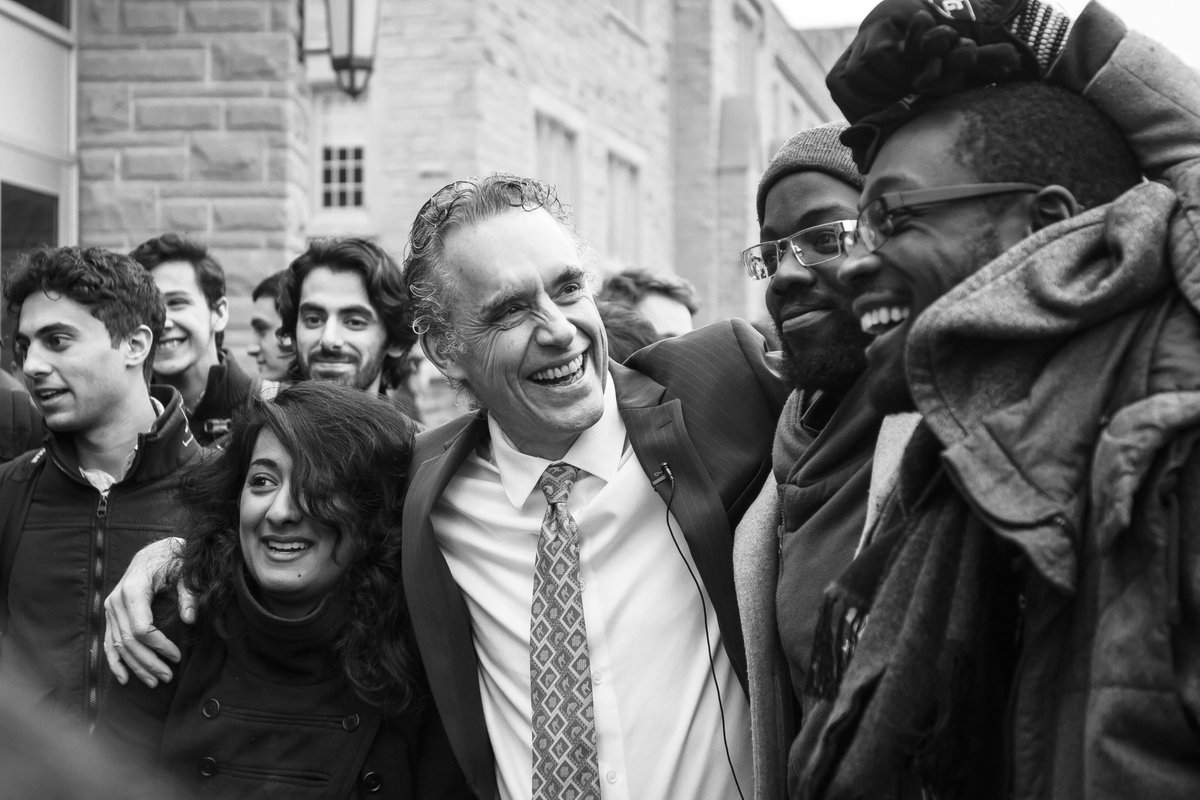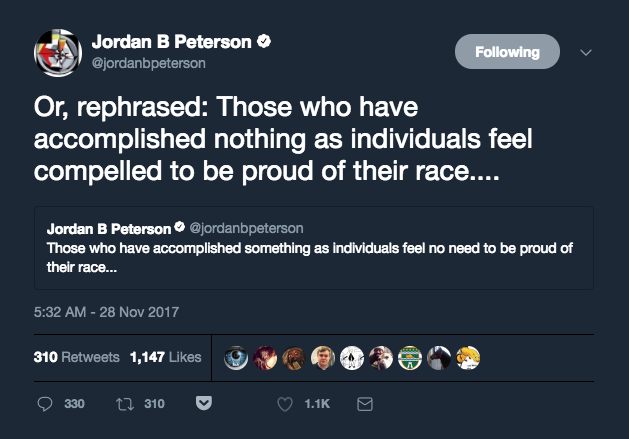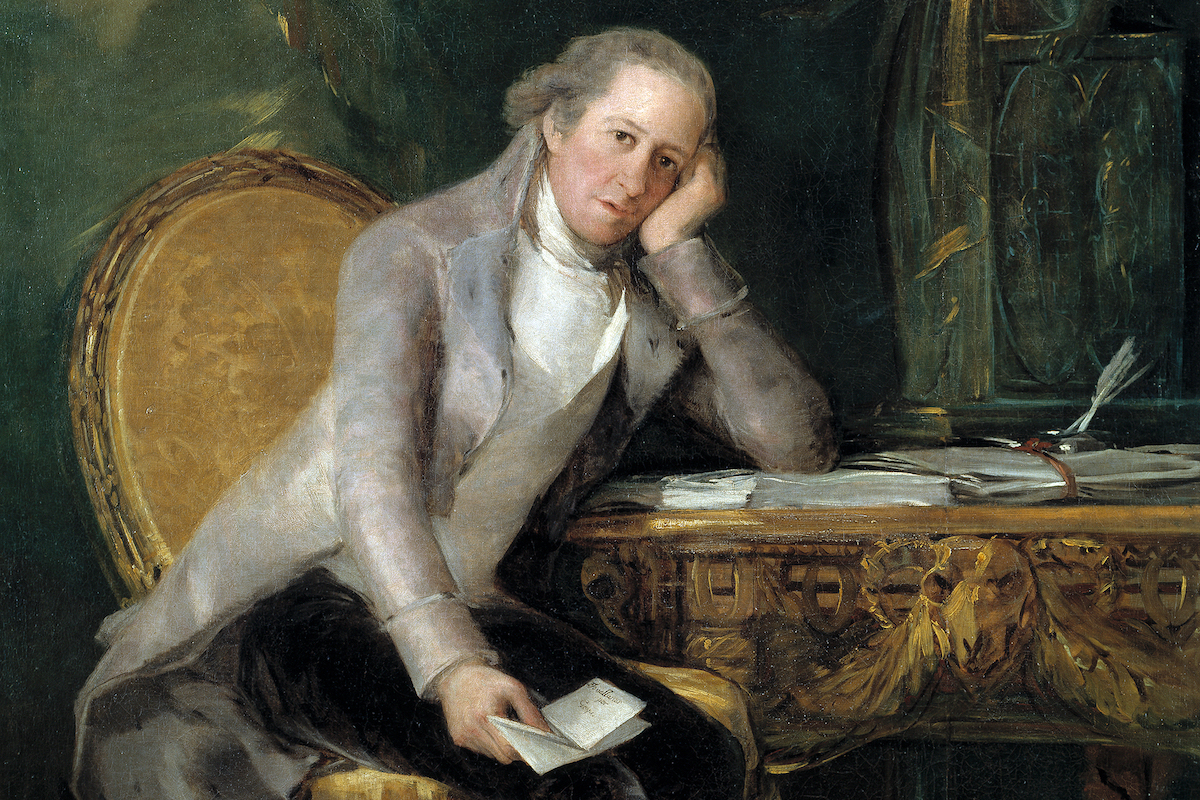Education
In Defence of Jordan B. Peterson
Peterson is celebrated in the news media as a champion of free speech and liberal, democratic values, while in fact promoting a far-right worldview.

A few days ago, Canadian author and English professor Ira Wells published an essay expressing concern about popular Canadian psychology professor and social critic Jordan B. Peterson. The essay was written in the wake of an incident at Canadian university Wilfred Laurier, where a teaching assistant was reprimanded for playing a short clip of a televised Peterson debate over the compelled use of gender pronouns. (I analysed the incident in Quillette last week.)
Regrettably, Wells’s essay is littered with inaccuracies and casual insults, accompanied by a moralistic undertone that is sure to turn off Peterson’s supporters, and perhaps even neutral observers. Nevertheless, I think he succeeds in condensing many of the common criticisms of Peterson, which makes the essay worth responding to as the foundation for a genuine debate of these issues. I suggest reading it if you haven’t already done so.
Wells’s main criticisms, as I understand them, are as follows:
- Peterson is celebrated in the news media as a champion of free speech and liberal, democratic values, while in fact promoting a far-right worldview.
- Peterson has made no substantial contribution to academia and misunderstands the views he is criticising under the label of ‘postmodern Neo-Marxism.’
- Peterson’s criticism is based on a desire to cling to old-fashioned social structures and a society of winners and losers.
I’ll address each of these points in turn, before summarising. For the record, I don’t consider myself a supporter of Peterson, although I agree with his core assertions. (I am not a donor.) The arguments presented are my own, or in the case where I am representing Peterson’s views, my interpretation of his views.
* * *
Criticism #1: Peterson is celebrated in the news media as a champion of free speech and liberal, democratic values, while in fact promoting a far-right worldview.
After beginning the essay by summarising the Laurier situation and noting that it has led many in the news media to proclaim that Peterson was right, Wells writes:
Peterson may be correct that, in some cases, universities have failed to strike the right balance between protecting minority rights and preserving liberal, democratic values, including freedom of speech. The Laurier incident is one of those cases. The problem is that Peterson folds this argument into a politically reactionary and often downright paranoid worldview that appears designed to curry favour with the alt-right.
The term ‘alt-right’ was coined by white nationalist Richard Spencer in 2010 and centres around ideas of white nationalism, white identity, and white supremacy. Wikipedia defines it simply as “a loosely defined group of people with far-right ideologies who reject mainstream conservatism in favor of white nationalism.”
Peterson has been careless in several of his tweets, with regard to the alt-right. Taken out of context, they could conceivably be interpreted as indifference towards the alt-right and their ideas. Peterson’s body of work, though, shows that he has consistently condemned white nationalism. He discussed the issue at length in a podcast he appeared on a few months ago with biologist Bret Weinstein and host Joe Rogan. I recommend that anyone in doubt about Peterson’s dislike of white nationalism watch the entire podcast. It’s very long and unscripted, thus allowing for an in-depth and off-the-cuff articulation of his views.
Here is a more recent tweet of his on the matter:

Furthermore, in his most recent online Q&A session, Peterson addressed the ‘Jewish Question’ – a common alt-right belief that Jews are intent on destroying the white race and/or Western civilisation – by applauding the fact that there are many Jews in positions of authority. Peterson could hardly have made a statement less appealing to the alt-right. This, combined with his condemnation of white nationalism, is not the behaviour of someone whose views are “designed to curry favour with the alt-right.”
Setting that part aside, what does Wells mean by “politically reactionary and often downright paranoid”? He offers several accusations in that same paragraph, presumably intended as evidence of the aforementioned phrase. I won’t address all of them, but a few do merit attention for being especially misleading.
Wells references a tweet Peterson sent out in April, with the wording “Islamophobia: a word created by fascists and used by cowards to manipulate morons.” By including it in the paragraph, Wells implies that it is further evidence of Peterson’s far-right worldview. What Wells does not mention, however, is that Peterson was quoting a line in the article in USA Today he was retweeting, written by an American Muslim apostate relating an incident at a Pakistani University where a young man was beaten to death by a mob who thought he had made fun of the prophet Mohammed. The article argued that the fear of being labelled an Islamophobe was preventing people from criticising Islam and its practice.
This followed a tweet Peterson sent out the month before, in which he criticised a motion put forward in Canadian Parliament calling on the Canadian government to condemn ‘Islamophobia.’ Peterson’s tweet implies that Islam is a set of ideas, as distinct from its adherents, and should therefore be open to criticism. Which is precisely what the USA Today article was saying. In fact, Richard Dawkins, Steven Pinker, Sarah Haider and several other social critics made a similar argument a few months later when Dawkins was de-platformed by a Berkeley radio station for the same reason.
Bear in mind that Islam is not just any set of ideas. It is the world’s fastest growing major religion with approximately 1.8 billion followers worldwide, and the majority religion in 50 countries. Not being able to criticise one of the world’s most influential belief systems is deeply problematic for obvious reasons. One could make an argument that Peterson using words like ‘fascists’ and ‘cowards’ and ‘morons’ is unnecessarily inflammatory, even when quoting someone else. The underlying message, however, is hardly far-right.
A second piece of evidence Wells puts forward about Peterson is that: “In a conversation with Camille Paglia, he lamented that men can’t exert control over “crazy women” by physically beating them.” This is so misleading that I recommend you go to the segment of the video in question and watch it yourself. What Peterson is saying is that men typically know how to deal with other men, where the escalation of a conflict is generally understood by both parties to lead towards physical confrontation. But because that is forbidden with a woman, men have no method of dealing with the type of non-physical aggression that is more typical of female conflicts, which are escalated and dealt with differently. All men can do, Peterson suggests, is throw their hands up in the air.

Wells also points out that Peterson “echoes Donald Trump on fake news, telling followers they can’t trust the media.” Earlier this year, Peterson was locked out of his YouTube account, where he at the time had more than 350,000 subscribers (now it is more than 500,000), due to an alleged violation of its Terms of Service. This occurred during a widespread crackdown from YouTube on conservative channels. When Peterson reported the story to a conservative news outlet, his account was restored without explanation. The comparison to Trump seems to imply some sort of right-wing conspiracy theory, but this was no such thing; it happened to Peterson personally.
Peterson closely followed the controversy involving former Google engineer James Damore, who was fired a few months ago after an internal memo he wrote was leaked to technology website Gizmodo, which mislabeled it an “anti-diversity screed.” An article at CNN.com reported that Damore was claiming that women are not biologically fit for tech roles, an article at Fortune.com called it an “anti-woman screed,” and an article at Time.com called it an “anti-diversity tirade.” These headlines are so misleading that it is no wonder Peterson would advise followers to be sceptical of the news media, especially when dealing with politically charged issues. (Damore’s memo is worth reading in its entirety.)
In short, none of Wells’s claims prove that Peterson is far-right. In fact, in a recent discussion with psychologist Jonathan Haidt, Peterson suggested that society needs a balance of liberal and conservative forces to function properly. Peterson seems to quite proudly embody elements of both, although he refers to himself as a “British classical liberal.”
* * *
Criticism #2: Peterson has made no substantial contribution to academia and misunderstands the views he is criticising under the label of ‘postmodern Neo-Marxism’.
Wells goes on to write about Peterson:
What he is not, however, is the author of any lasting work of scholarship, the originator of any important idea, or a public intellectual of any scientific credibility or moral seriousness. Peterson’s sole discovery is that “postmodernism” can be usefully exploited alongside the more familiar, established populist scare tactics. His message, as the intellectual guru of the alt-right, is that humanity’s natural hierarchies are under attack, that the future of Western civilization hangs in the balance of this “war of ideas.” Every form of populism needs its scapegoat and Peterson’s is the academic humanities, which he caricatures as “indoctrination cults” for “postmodern neo-Marxism.”
Psychologist Gad Saad ran a check of Peterson’s citations against those of the two professors in the Laurier meeting who, like Wells, had denigrated Peterson’s academic credentials.
Much more important, though, is the second part of the claim. Wells elaborates:
But what exactly does Peterson mean by “postmodern neo-Marxism”? In a recent series of lectures and interviews, all available on YouTube, Peterson traces this supposedly lethal strain of totalitarianism back to Jacques Derrida and Michel Foucault, two French philosophers whom he accuses of waging an “all-out assault on categories of intellectual thought.” The central claim of these postmodern thinkers, Peterson argues, is that “there are an infinite number of ways to interpret any finite set of phenomena.” As a direct result, our moral or aesthetic evaluations—our efforts to discern good from evil, beauty from ugliness, truth from falsehood—are arbitrary and therefore meaningless. The postmodernists left us in a relativistic fog from which we have yet to emerge.
This misses the essence of Peterson’s argument, which is that Derrida and Foucault combine the view described above with what he refers to as ‘neo-Marxism,’ and that the relativism of postmodernism and the universality of neo-Marxism are incompatible. What Derrida and Foucault are actually doing, he suggests, is using postmodernism as a cover for neo-Marxism, allowing them to reject positivism and logic as universal values under the guise of relativism, while in fact proceeding with a very specific universal normative theory. This “postmodern turn,” Peterson suggests, was necessitated by the collapse of Marxism as a viable theory during the 1960s. (Peterson’s talk on the subject can be seen here.)
So, when Wells goes on to suggest that Peterson misunderstands Derrida and Foucault because they argued that meaning was contextual, rather than infinite, he misses the point. When Peterson mentions Derrida’s labelling of the West as phallogocentric, he isn’t just talking about Derrida claiming that the West must be seen through a masculine and determinate/logical framework, but also that Derrida is implying it should be dismantled. The problem Peterson has with postmodernism–and Derrida, in particular–is that beneath the guise of relativity lies a universal normative framework of power, oppression, and liberation. Hence, his addition of the term ‘neo-Marxist.’
The mistaken belief that Peterson is only talking about postmodernism, rather than the conflation of postmodernism and neo-Marxism, leads Wells to make what he seems to think is a triumphant statement:
While only a tiny minority of humanities professors teach Derrida, a majority of the courses are dedicated to critical thinking, which is precisely what Lindsay Shepherd had hoped to nurture by showing the TVO clip in the first place. What makes critical thinking “critical” is the tendency to read against the grain of accepted wisdom and to question the inherited power hierarchies that structure human relations.
Derrida’s (and Foucault’s) ideas have been integrated into other fields of study. Whether or not they are taught directly is not that important. In fact, Wells manages to demonstrate just that in his very next sentence. Wikipedia defines critical thinking as “the objective analysis of facts to form a judgment.” Notice that there is no mention of power hierarchies. What Wells is referring to is not critical thinking, but Critical Theory, a methodology developed by Marxian social scientists during the early-to-mid 20th century, to which Derrida and Foucault can be described as contributing later on.
What distinguishes Critical Theory from traditional inquiry is that it articulates an explicit purpose for itself: to liberate people from oppression. The Critical Theorists were heavily inspired by Karl Marx, and one of Marx’s most famous statements articulated the distinction that would come to separate Critical Theory from traditional science and philosophy: “Philosophers have hitherto only interpreted the world in various ways; the point is to change it.”
What’s left unstated here is that the purpose is not to change the world arbitrarily, but according to the particular goal of liberating people from oppression. Science thus becomes a tool for achieving a predefined societal state. This reflects a significant departure from traditional scientific methodology, which discourages defining purposes. Consequently, the use of the term ‘critical’ is misleading. The idea is to criticise power structures within the context of liberating people from their oppression. The purpose itself is above criticism.
The fact that Wells confuses critical thinking with Critical Theory supports Peterson’s claim that neo-Marxism has taken over the humanities. Proper critical thinking would not just question power hierarchies, it would also ask why we should question them. In other words, it would question the foundation of Critical Theory itself. But, as the Laurier incident demonstrated, these questions are not to be asked.

In practice, this declares all power structures indefensible, since virtually all power structures can be cast as oppressive, and justifying oppression is forbidden. This leaves students with only one method of inquiry: to criticise power structures with the intent of dismantling them.
As this gets more extreme, students don’t engage in inquiry at all, and everything becomes about fighting oppression. A very interesting comment below my previous article compared Critical Theory to Marxist praxis:
I was briefly a Marxist whilst studying philosophy at an English university in the Sixties, where I took a course on it. The lecturer, himself a keen Marxist, pointed out that Marxism was not a theory but a ‘praxis’, and its postulates were simply whatever ran counter to the current status quo, the idea – borrowed from Hegel – being to create an antithesis to the thesis and bring about a synthesis, namely the dictatorship of the proletariat.
In other words, any sort of nonsense was fine as long as it countered the establishment viewpoint, the aim being to use any means whatsoever to tear it down. This included violence of any kind, physical, social, cultural, intellectual . . . including the complete disregard of truth. Whatever would bring about revolution was good, because an egalitarian society would surely arise from the ashes. […]
Critical theory and post-modernism seems to be the continuation of exactly the same thing, a wolf in sheep’s clothing, and a dumb wolf at that, with its adherents intellectually dissociated from reality (which they don’t believe exists anyway) psychologically and emotionally regressed (being conspicuously childish or adolescent) and completely oblivious to history and to where all this inevitably leads.
There is one important difference, I think, between Marxist praxis and modern Critical Theory: the former tries to take a sledgehammer to society, trying to tear it all down in one go, while the latter uses a million tiny hammers, each chipping away at little bits of societal structure. It is this view that Peterson expressed when he appeared on a TVOntario television debate last year and made the following statement:
Is it a cabal of radical left-wingers? Yes, it’s a cabal of radical left-wingers, and they’ve been active behind and in front of the scenes increasingly over the last thirty years. And my estimation is that departments like women’s studies have trained between three hundred thousand and three million radical left-wing activists.
These activists have increasingly begun to populate mid-level administrative positions in society, eager to apply their praxis to dismantle societal structures in the pursuit of vaguely defined ‘equality,’ and it is about this state of affairs that Peterson has been sounding the alarm for the past year. This situation is also what got James Damore fired a few months ago, when he tried to warn against an increasingly dogmatic and stifling left-wing environment at Google. Damore was not fired because what he said was false, but because challenging the dogma of Critical Theory is forbidden. And this is surely just the beginning.
* * *
Criticism #3: Peterson’s criticism is based on a desire to cling to old-fashioned social structures and a society of winners and losers.
Wells argues:
Peterson’s immense popularity on the far right lies precisely in his intellectual validation of those traditional power hierarchies as natural and necessary—a message perfectly attuned to those who feel dispossessed and threatened by movements for sexual and racial equality. Most of Peterson’s videos offer variations on the theme that human behavior is the product of an ancient “male dominance hierarchy” that separates winners from losers—and that any attempt to question or subvert this hierarchy will result in unhappiness for the individual or chaos for society.
This suggests that Peterson believes in a society of eternally fixed hierarchies, which is simply not true. In fact, Peterson has consistently argued that part of the value that people on the Left bring to society, especially very creative people with high openness to experience, is that they are able to challenge existing structures and improve them. What Peterson is arguing against is the belief that power structures are inherently bad and should be removed. He’s arguing against the idea of radical liberation that underlies modern leftist thought, believing that if carried far enough it will lead to societal collapse and the absence of meaning.
Students have only been given one tool – to identify flaws in societal structures and dismantle them. They haven’t been given the tools to look holistically at the world, to understand that societal structures have functions. Structures hold society together, they allow competence to rise, and they provide meaning. But increasingly all that students can see is power and oppression, Peterson argues.
Wells continues:
To fully grasp the depth of Peterson’s belief in power hierarchies, take his commitment to IQ testing: “If you don’t buy IQ research,” he has told his students, “then you might as well throw away all of psychology.”
This seems to imply that Peterson believes all of psychology rests on top of IQ research, but that’s not what he’s saying, at least not to my knowledge. What he’s saying is that IQ research is among the most reliable research in psychology. In other words, if you don’t find IQ research reliable, there’s almost no research in psychology that you would find reliable.
After criticising the reliability of IQ research, and painting an overly rigid picture of Peterson’s view on IQ, Wells ends his criticism of Peterson with this:
In the tradition of nineteenth- and early twentieth-century pseudo-scientists, phrenologists, quacks, and scientific racists, Peterson’s commitment to IQ is simply the reflection of his commitment to an unalterable hierarchy of human beings. […] For Peterson, transgender people and powerful women upset the “male dominance hierarchy” that forms the centerpiece of his thought. His worldview is predicated on the promise of restoring authority to those who feel disempowered by the globalism, feminism, and social-justice movements he derides.
To repeat, this is not what Peterson is saying. He’s arguing against the idea that societal structures are inherently bad, and thus against the far-Left belief that they must be dismantled on principle. Peterson freely admits he doesn’t know where to draw the line. But his point is that there is no longer any counterbalance to far-Left orthodoxy at universities, which has led to indoctrination about the evils of societal structures.
* * *
Wells ends with an appeal for the humanities to meet Peterson head on. But what is there to meet about? Praxis may work well in dismantling societal structures, but it serves no purpose in an actual debate. As long as the humanities are entrenched in a quasi-religious ideology that holds its core views sacred, there is no real debate to be had. As soon as Peterson were to advance his criticisms, he would be met with claims that his words are violence, that he is denying people’s right to exist, or simply that he is a sexist, a racist, and/or a homophobe.
Incidents on university campuses have demonstrated this over and over again, from students hunting Bret Weinstein with baseball bats to students swaying and chanting in unison to drown out Charles Murray. In fact, this very thing happened to Lindsay Shepherd, whom Wells holds up as a model for critical thinking. She has been protested, she has been condemned by fellow students, and she has been met with accusations of “white fragility,” “white tears” and “white women tears.” When she objected to this racially-charged language, she was called a racist. (Apparently objecting to the use of such terms is racist if you’re white.)
I suspect that very few people outside universities would view this whole episode to be anything other than disgraceful. Perhaps the fact that many regular people support Peterson is not because they’re far-right bigots, but because universities–and humanities departments, in particular–have come to resemble religious cults. Instead of painting Peterson as the enemy the humanities must rise up to defeat, I suggest that Wells listens more carefully to Peterson’s criticisms and takes a look inward. He might even find that Peterson has a point.






